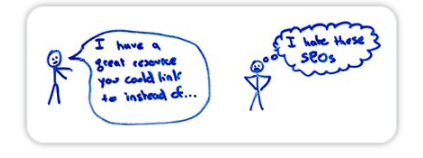 One of my very favorite blogs is the one Moz produces.
One of my very favorite blogs is the one Moz produces.
It hits my email every morning as I’m walking to my office, after dropping off the Small Child at school.
I read it as I walk, and absorb as much as I can while making mental notes to include in our work with clients, with the PR Dream Team, and in content on this blog.
They have figured out how to take a technical topic and make it easy-to-understand for those not in the industry.
And, when something is not the first language, it’s nice to have teachers who make it easy to understand.
You may wonder why I care so much about search engine optimization.
It’s because everything we do as communicators leads back to more awareness.
More awareness equals first page Google results.
First page Google results equals search engine optimization.
The lines between search engine optimization and communications are blurring.
Big time.
The job of the SEO specialist is to earn links to an organization’s website.
The role of the communicator is to build awareness.
Often that comes through media relations, which provides an earned link to the organization’s website.
That’s why, when “5 Tactics to Earn Links Without Having to Directly Ask” hit my inbox, I took note.
The Problem with Link Building
Rand Fishkin, in his Whiteboard Friday (which I want to steal, BTW), described the challenge SEO specialists have when working on earned links.
This is what he says:
There are ways to earn links, even from very specific sources, without needing to directly say, “Hey, will you please link to this?” The problem is that most of the web at this point is sort of burned out on this conversation of, “Hey, I have this great resource.” Or, “Hey, you linked to this thing which is currently broken and so maybe you’d like to,” or “Hey, I noticed that you frequently mention or link to blah, blah, blah. Well I have a blah, blah, blah like blah, blah, blah.”
If you run a content marketing program of any type, you’ve likely had this pitch:
I noticed you recently wrote about the new hazardous waste regulations from the EPA. We have a white paper that speaks to that very topic. Would you mind linking to it?
I do mind.
I don’t know you and I don’t know your content.
Why would I include a link that pretty much signifies I endorse you?
Now let’s say you’re a journalist and a communications pro sends you that email.
How effective is it?
(I’ll answer that: It’s not. At all. Don’t do it. It’s bad.)
And yet…
This is why Rand says it’s is a problem.
It’s an issue with SEO specialists and it’s a problem among communications pros who mass distribute news releases.
What’s the Solution?
Rand has five solutions, which surprisingly mirror the work communicators do.
Lines blurrrrrrrring.
His recommendations are:
- I made this thing you’ll probably use
- You list things like X, I have or I am an X
- Let me help you with that
- I’d be happy to provide an endorsement
- Guest contribution
In my mind, the first two can very easily devolve into the problem described above.
As communicators, those first two are not going to be effective.
Our job is to use media and influencer relations to build awareness, get first page Google listings, and drive traffic.
To reach those goals, you do need to earn links from highly valuable publications, websites, and blogs.
That’s why the last three recommendations from Rand will work to achieve all three goals.
Let’s explore them, from a communicator’s point-of-view.
To Earn Links, Be Helpful
Let’s go back to basics for a minute.
Remember when you began your career (maybe it was in May or perhaps it was 30 years ago)?
Think back to the first time you had to pitch media.
What did you do?
I’ll tell you what I did.
I checked a Bacons book out of our agency’s library, made photocopies of the pages I needed, and checked it back in.
Then I went back to my office and highlighted the media outlets I thought most beneficial to the client I was assigned.
I carefully created a list, walked over to production, and asked for copies of the publications.
Carefully balancing a stack of magazines and newspapers, I went back to my office and started reading everything I could find that the journalist who was on my list wrote.
Once I felt like I was armed with enough information about the journalist, I picked up the phone.
I never pitched them my client or a product or service.
I always offered help:
In the May issue of Food & Wine, you wrote about white fish that takes on the flavor of the seasoning you use. Would it be helpful if I asked around the office to see if anyone has new recipes that might benefit your readers?
Though I worked on The Catfish Institute account—and it is a white fish that takes on the flavor profile of what it’s seasoned with—I wouldn’t even mention them.
My job, at the beginning of the relationship, was to be helpful and provide journalists more of what I knew they needed.
Five Ways to Be Helpful
Today, of course, this is much, much easier.
You can research a journalist in about 5.2 seconds and have all of the information you need to build up to getting that valuable link.
Here are a few ways you can do that:
- Create a Twitter list of the journalists, bloggers, and influencers who matter to your organization. Anytime they tweet something where you can be helpful, respond. In the meantime, retweet and share everything they post, as it relates to your industry.
- Build a Feedly group of content your contacts create. When they publish something new, share it liberally. If they write something that compels you to comment—do it! There is not a faster way to build a relationship with a content creator than commenting on their stuff.
- For those on your list who have podcasts or books, write reviews, which are what build authority in places like iTunes and Amazon. You’re helping them strengthen their own awareness, which is not only being helpful, but providing you great karma.
- If they have a YouTube channel, subscribe! Watch, share, and comment on videos.
- If they are on Instagram or have public-facing Facebook pages, follow them there. Engage with them. In some cases, you’ll stick out because you’re the only sane person commenting. (They say not to read the comments for a reason!)
This all takes time, of course, but you are building relationships with human beings.
Some of my very best friends today are the journalists I took the time to help and get to know early in my career.
Eventually being helpful will come back to you, and you’ll be able to earn that precious link to your website.
To Earn Links, Provide an Endorsement
One of my very favorite tools in the whole, wide world is Sanebox.
I love it so much, I wrote a 920-hundred-word love note to them.
This is one gigantic endorsement.
There are lots of other ways you can provide endorsements for the journalists, bloggers, and influencers on your list.
- The List Articles. LOTS of bloggers and influencers write the list articles. You know…the “42 Experts on the Best Hot Dogs in Chicago” articles. If you have a different perspective or a hot dog you love not on the list, by all means! Let the author know. This, of course, will provide you an opportunity to get a link back to your site.
- Reviews, Comments, and Shares. We talked about this above. Do it. Now. Do it constantly. It works. If you want to try it risk-free, comment on this very blog post. I promise we won’t bite you, and you’ll quickly get comfortable jumping into the fray. Take that experience to an intimidating publication next.
- Testimonials. Just like I did with Sanebox, you can take the same approach to provide a testimonial of your work with a blogger or influencer. This doesn’t work as well with journalists, but if the others on your list have websites or blogs that could benefit from a testimonial, you help them and they give you a link to your site.
To Earn Links, Contribute Content
This is the one you’re most likely familiar with—create contributed content for your targeted media outlets and blogs.
You can call it OpEds or bylined articles or contributed content; it’s all the same.
When you create content for other sites—including media outlets—you can include one link to your site.
In some cases, they’ll only let you link to your site in your bio.
That’s OK!
Be very targeted about what you link to there, though.
Instead of, “Gini Dietrich is the founder of Spin Sucks” do “Gini Dietrich is the founder of PR professional development site, Spin Sucks.”
Then make sure the link to your site is anchored to “PR professional development” and not to “Spin Sucks.”
The idea being that if you want to be found in Google search results, people who know your business will already know to look up your name.
If they’re looking for a professional development site for PR pros, they may not already know you.
Make sure they find you.
Earn Links and Win SEO Dominance
All of this can seem overwhelming.
Don’t try to do it all at once!
If I were starting from scratch, I would start with one of the bullet points under “Five Ways to Be Helpful” above.
You can build from there.
The goal of this work is to establish links to the content you’re painstakingly creating.
If you target media outlets and blogs with higher domain authority than your own, you can do that slowly and methodically.
